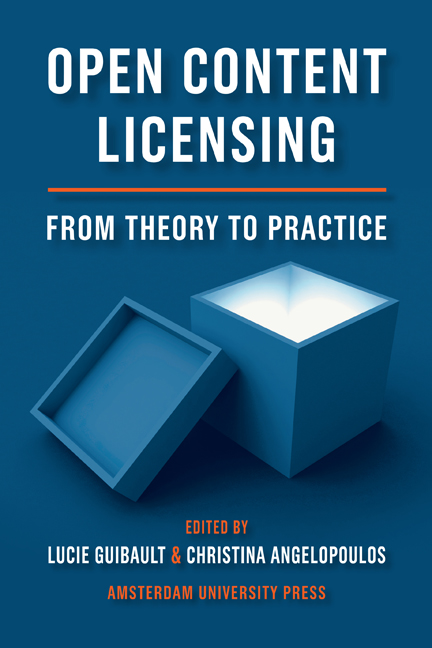Book contents
- Frontmatter
- Contents
- 1 Open Content Licensing: From Theory to Practice – An Introduction
- 2 Towards a New Social Contract: Free-Licensing into the Knowledge Commons
- 3 Is Open Content a Victim of its Own Success? Some Economic Thoughts on the Standardization of Licenses
- 4 (Re)introducing Formalities in Copyright as a Strategy for the Public Domain
- 5 User-Related Assets and Drawbacks of Open Content Licensing
- 6 Owning the Right to Open Up Access to Scientific Publications
- 7 Friends or Foes? Creative Commons, Freedom of Information Law and the European Union Framework for Reuse of Public Sector Information
- 8 Contributing to Conversational Copyright: Creative Commons Licenses and Cultural Heritage Institutions
- 9 Creative Commons and Related Rights in Sound Recordings: Are the Two Systems Compatible?
4 - (Re)introducing Formalities in Copyright as a Strategy for the Public Domain
Published online by Cambridge University Press: 22 January 2021
- Frontmatter
- Contents
- 1 Open Content Licensing: From Theory to Practice – An Introduction
- 2 Towards a New Social Contract: Free-Licensing into the Knowledge Commons
- 3 Is Open Content a Victim of its Own Success? Some Economic Thoughts on the Standardization of Licenses
- 4 (Re)introducing Formalities in Copyright as a Strategy for the Public Domain
- 5 User-Related Assets and Drawbacks of Open Content Licensing
- 6 Owning the Right to Open Up Access to Scientific Publications
- 7 Friends or Foes? Creative Commons, Freedom of Information Law and the European Union Framework for Reuse of Public Sector Information
- 8 Contributing to Conversational Copyright: Creative Commons Licenses and Cultural Heritage Institutions
- 9 Creative Commons and Related Rights in Sound Recordings: Are the Two Systems Compatible?
Summary
Introduction
Formalities are an oddity in copyright law, at least for the countries adhering to the Berne Convention. Recently, however, many voices have been heard in favour of the reintroduction of formalities in copyright law, in order to counteract the rapid expansion of copyright protection and the ensuing diminishing of the public domain.
The idea of reintroducing some formal requirements in the copyright regime, so as to render access to copyright protection less automatic, has mostly appeared on the agenda of the open content proponents. As described by Lessig, the Copyleft initiatives aim, with a straightforward ‘Us Now – Them After’, to enable those creators who wish (‘Us’) to give the public (‘Us’ again) free access to their works. A further and necessary step to extend that regained freedom to the whole range of copyrighted works would be to convince legislators to introduce some elements for enhancing the opening of content by granting copyright owners (‘Them’) a limited monopoly on their works. Such a strategy, subsidiary and parallel to the deployment of Copyleft licenses, flows from the realization that the open source and open content licenses will not be sufficient to open access to and use of all creative content, if nothing is done to limit the extent of copyright in creative content.
Introducing new formalities in copyright, or reintroducing old ones, is one of the suggestions made by some scholars to reduce the power and extent of copyright. Formalities have been considered as a way to limit the automatic granting of copyright, to shorten its duration or to make its enforcement less easy. Ultimately, such formalities would either aim at putting more works into the public domain or at making protected works more easily available and usable.
Thus, such formalities are conceived as opt-in mechanisms, i.e. as gateways through which the creator should pass in order to benefit from the protection of copyright or from some of its added features. In the history of copyright, formalities have always been considered, in the countries that provided them, as opt-in systems. Copyright was granted upon the condition of complying with the formalities required by the law, whether registration, deposit of copies, copyright notices and so on.
- Type
- Chapter
- Information
- Open Content LicensingFrom Theory to Practice, pp. 75 - 106Publisher: Amsterdam University PressPrint publication year: 2012

